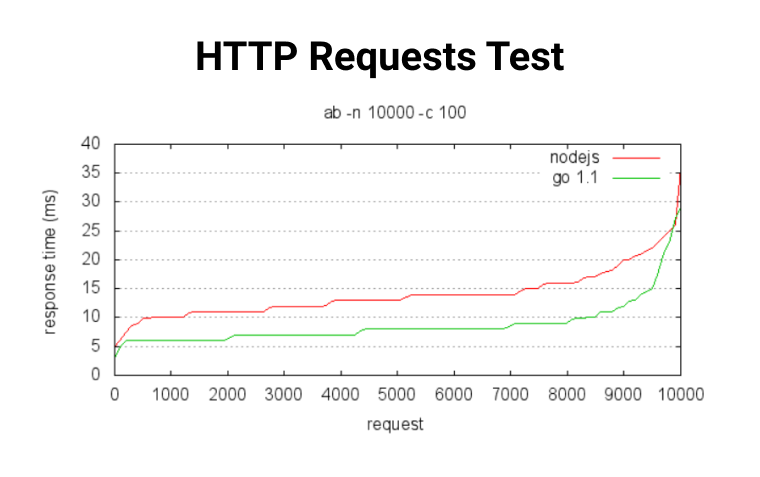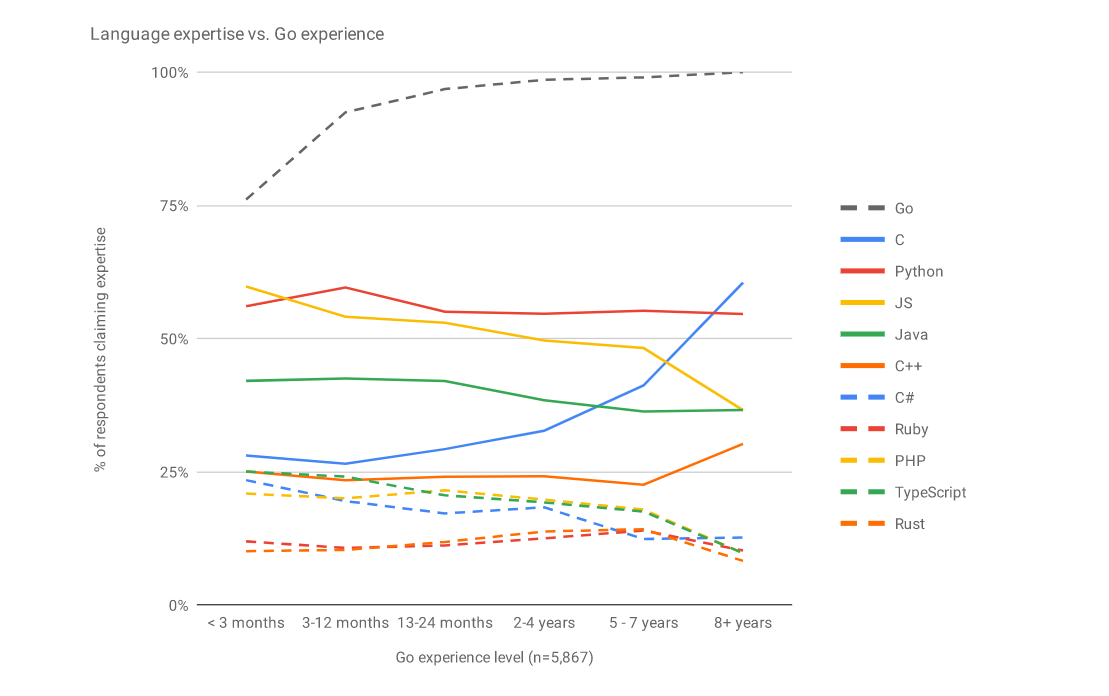A solid backend guarantees app performance and scalability and ensures security. Backed errors are the reason you may experience app crashes under high loads, long response times, and even data leaks.
There are plenty of tools to use for backend software development, and deciding which is the best can be tough. Today we will compare two of the most popular backend technologies — Golang ad Node.js — and see which comes out as the best fit.
Golang
Golang, or Go, as many refer to it, is an open-source programming language developed by Google. Introduced to the developer community in 2009, Go is a statically typed, multipurpose, cross-platform, and high-performing programming language.
Go was set to combine the advantages of the most popular languages while eliminating their drawbacks. The language is quite similar to C in terms of speed and syntax, which allows for writing readable and maintainable code. On top of that, Go is as efficient as C++ and Java.
The very first version of Go was made available to developers in 2011, and it has been growing in popularity ever since. According to the Popularity of Programming Language Index, Go is now 14th in popularity, compared with 17th place in 2019.
Go is now utilized by companies such as Uber, SoundCloud, BBC, Basecamp, and others.
Node.js
Just like Golang, Node.js is an open-source JavaScript runtime environment. A cross-platform tool, it’s great for building web-servers. On top of that, developers can easily write the server-side and the client-side of the software in one code, since Node.js runs JavaScript code.
Since its introduction in 2008, we have seen many major companies adopting Node.js. Among those are Netflix, eBay, and Groupon. In fact, Node.js is among the 10 most popular JavaScript development frameworks.
Which is Best?
To answer this question, we will be comparing these two technologies based on the following factors:
- performance;
- scalability and concurrency;
- community;
- tools; and
- error handling.
Performance
Users won’t be happy with an application that struggles to load, so performance is quite important.
Golang
Developers using Golang report similar performance to that of C and C++. The programs in Go work fast and don’t need warmup time, thanks to the absence of a virtual machine.
Another perk is a garbage collector. This is a feature of autonomous memory management: it analyzes the occupied memory and frees portions of it that are no longer needed.
Thanks to efficient memory management and fast response time, Go is a great tool for building microservices.
Andrei Volosyuk
Go Developer
at HQSoftwareGolang was a good choice in one of our projects. We have developed the application that lets users control their smart home devices from different manufacturers in one place. We chose Golang for the project because it allows for building responsive software that handles lots of requests with ease.
Node.js
Node.js also has some tricks up its sleeve. For instance, the non-blocking nature of the JavaScript language allows for performing several tasks in the background.
Another advantage is a V8 engine. V8 is a JavaScript and WebAssembly engine written in C++, which guarantees great performance. It is considered by many developers to be one of the fastest JavaScript engines.
And lastly, the reusability of Node.js code makes it possible for event-based applications to update data in real-time. This is why Node.js is applied to building instant-messaging apps, video-chats, and online games.
Igor Kunovsky
Node.js Developer
at HQSoftwareWe have successfully applied Node.js to one of our traffic control projects. The application is set to present the traffic information to the user in a form of a roadmap with highlighted events, such as speed cameras, traffic jams, roadworks, and so on. We chose Node.js for its ability to quickly update the information in real-time.
But there are a couple of drawbacks. Because JavaScript is an interpreted language, it actually takes more time to execute Node.js code than Go.

Scalability and Concurrency
Concurrency refers to the ability of a program to run calculations separately and simultaneously. With concurrency, the program uses the CPU more efficiently, which has a positive effect on performance.
Concurrency correlates with the app’s ability to scale and handle thousands of requests at once. Software that performs reliably under high loads is essential for many businesses.
Golang
Golang can be a great tool for developing large software projects: concurrency is backed with features such as channels and goroutines. Goroutines are functions that run in parallel with other functions. The Go environment allows for running thousands of routines because of how lightweight they are. The initial size of a goroutine is 4 KB.
Node.js
Node.js can’t really offer similar features. It is single-threaded, which means that execution is performed in sequence. That can lead to app slowdowns.
Community
Community is also one of the most important features of a particular technology. With a large enough community, you may be sure that the technology is supported with third-party modules and plugins, and that bugs will be traced and fixed fast.
Golang
As mentioned before, Go is an open-source technology, meaning that there is an active community working on improving it. But it is rather small compared to Node.js.
Golang is backed by Google and has an annual conference dedicated to software development: GopherCon.

In the latest Golang Survey of 2019, the developers’ expertise in Go is growing in comparison to expertise in other languages.

Like many other technologies, Go has its own GitHub repository.
Node.js
The Node.js community is larger than that of Go. Node.js also has its GitHub repository, and it is a part of the OpenJS Foundation, whose mission is to support the growth of the JavaScript ecosystem and web technologies.
The Foundation has IBM, PayPal, and Microsoft among its members. The community also organizes Node+JS Interactive, where the developers announce new features of the technology.
Tools
These are ready-made extensions that extend the feature-set of the technology and cut development time and costs. The more tools you have, the more you can accomplish without the need to build something from scratch.
Golang
Because Go has a basic full-fledged library of features, you won’t find a lot of third-party modules here. For instance, Golang does not have the GUI library, which would have been very useful for building consistent and intuitive UI with ease.
Node.js
Node.js can certainly boast a huge variety of tools. One of its great advantages is the NPM, or Node.js Package Manager. It includes around 800,000 fully developed modules that developers can install without the hassle of tweaking them.
This is possible thanks to the Node.js microservices architecture. It consists of smaller modules that can add new features and components to the software.
Want to Build a Reliable Software?We provide skilled professionals to tackle your project
Julia Tuskal
Head of Sales
at HQSoftware
Error Handling
The ways those two software development tools handle errors are also different. Each of these methods has a different effect on development time and convenience for programmers.
Golang
Go requires error checking while the program is running, with error codes returned afterward. Though this makes the process more difficult, it guarantees more reliable software in the end.
Node.js
Node.js is all about a more boiled-down approach when it comes to errors: they are caught immediately as they occur. But with that approach, the stability of software might be an issue.
Bottom Line
At the end of the day, both Golang and Node.js have their own pros and cons.
| Golang | Node.js | |
| Performance | Good | Medium |
| Scalability / Concurrecny | Good | Medium |
| Community / Tools | Medium | Good |
| Error handling | Poor | Medium |
Golang development is suitable for applications that perform well and fly through large volumes of data, but lacks good error-handling techniques and third-party plugins.
Node.js, on the other hand, can struggle a bit under high loads, but offers more flexibility for programmers with plenty of development tools.

Founder
Hey! Welcome to our blog!
The topics we cover include IoT, AR/VR, related news, and our projects.If you’d
like to discuss an article, please
messsage
me on LinkedIn
Related Posts
View All
We are open to seeing your business needs and determining the best solution. Complete this form, and receive a free personalized proposal from your dedicated manager.

Sergei Vardomatski
Founder







